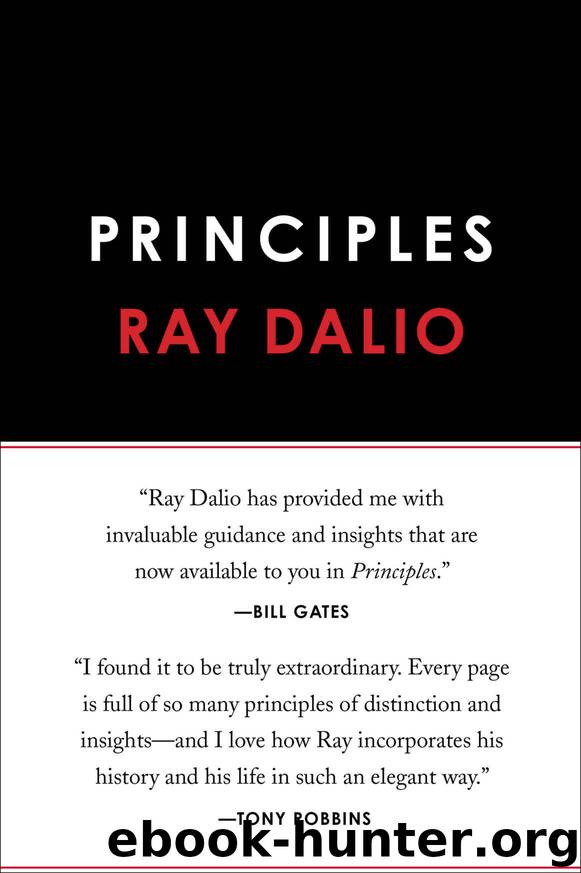Principles by Dalio Ray

Author:Dalio, Ray
Language: eng
Format: epub, mobi
Publisher: Simon & Schuster
Published: 2017-09-19T04:00:00+00:00
5.12 Be cautious about trusting AI without having deep understanding.
I worry about the dangers of AI in cases where users accept—or, worse, act upon—the cause-effect relationships presumed in algorithms produced by machine learning without understanding them deeply.
Before I explain why, I want to clarify my terms. “Artificial intelligence” and “machine learning” are words that are thrown around casually and often used as synonyms, even though they are quite different. I categorize what is going on in the world of computer-aided decision making under three broad types: expert systems, mimicking, and data mining (these categories are mine and not the ones in common use in the technology world).
Expert systems are what we use at Bridgewater, where designers specify criteria based on their logical understandings of a set of cause-effect relationships, and then see how different scenarios would emerge under different circumstances.
But computers can also observe patterns and apply them in their decision making without having any understanding of the logic behind them. I call such an approach “mimicking.” This can be effective when the same things happen reliably over and over again and are not subject to change, such as in a game bounded by hard-and-fast rules. But in the real world things do change, so a system can easily fall out of sync with reality.
The main thrust of machine learning in recent years has gone in the direction of data mining, in which powerful computers ingest massive amounts of data and look for patterns. While this approach is popular, it’s risky in cases when the future might be different from the past. Investment systems built on machine learning that is not accompanied by deep understanding are dangerous because when some decision rule is widely believed, it becomes widely used, which affects the price. In other words, the value of a widely known insight disappears over time. Without deep understanding, you won’t know if what happened in the past is genuinely of value and, even if it was, you will not be able to know whether or not its value has disappeared—or worse. It’s common for some decision rules to become so popular that they push the price far enough that it becomes smarter to do the opposite.
Remember that computers have no common sense. For example, a computer could easily misconstrue the fact that people wake up in the morning and then eat breakfast to indicate that waking up makes people hungry. I’d rather have fewer bets (ideally uncorrelated ones) in which I am highly confident than more bets I’m less confident in, and would consider it intolerable if I couldn’t argue the logic behind any of my decisions. A lot of people vest their blind faith in machine learning because they find it much easier than developing deep understanding. For me, that deep understanding is essential, especially for what I do.
I don’t mean to imply that these mimicking or data-mining systems, as I call them, are useless. In fact, I believe that they can be extremely useful in making decisions in which the future range and configuration of events are the same as they’ve been in the past.
Download
This site does not store any files on its server. We only index and link to content provided by other sites. Please contact the content providers to delete copyright contents if any and email us, we'll remove relevant links or contents immediately.
Bad Blood by John Carreyrou(6597)
Rich Dad Poor Dad by Robert T. Kiyosaki(6569)
Principles: Life and Work by Ray Dalio(6369)
Playing to Win_ How Strategy Really Works by A.G. Lafley & Roger L. Martin(6170)
Management Strategies for the Cloud Revolution: How Cloud Computing Is Transforming Business and Why You Can't Afford to Be Left Behind by Charles Babcock(4558)
The Confidence Code by Katty Kay(4233)
Thinking in Bets by Annie Duke(4199)
American Kingpin by Nick Bilton(3844)
Delivering Happiness by Tony Hsieh(3407)
Project Animal Farm: An Accidental Journey into the Secret World of Farming and the Truth About Our Food by Sonia Faruqi(3205)
The Power of Habit by Charles Duhigg(3114)
The Tyranny of Metrics by Jerry Z. Muller(3045)
Brotopia by Emily Chang(3035)
Mastering Bitcoin: Programming the Open Blockchain by Andreas M. Antonopoulos(3026)
The Marketing Plan Handbook: Develop Big-Picture Marketing Plans for Pennies on the Dollar by Robert W. Bly(3024)
I Live in the Future & Here's How It Works by Nick Bilton(2969)
The Content Trap by Bharat Anand(2904)
Building a StoryBrand by Donald Miller(2877)
Applied Empathy by Michael Ventura(2876)
